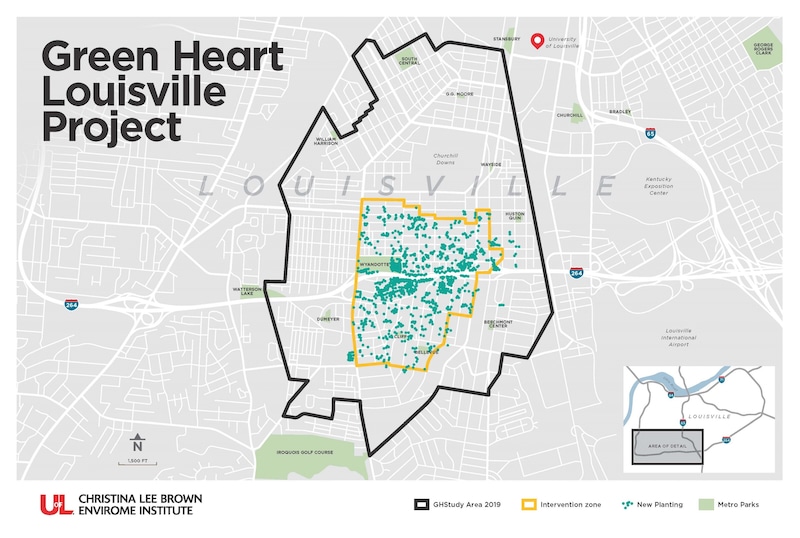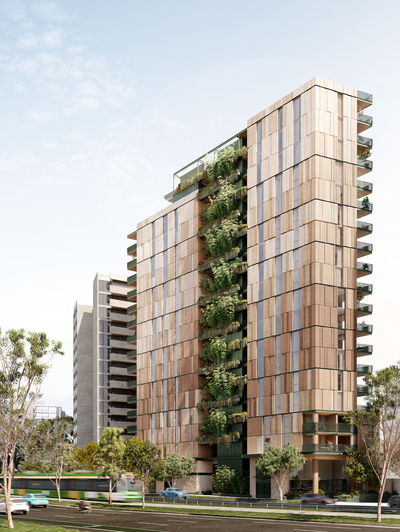
by Komoneed | Sep 2, 2024
Jobs in the clean energy industry are taking off, with jobs in this field growing at twice the rate as the overall job growth rate in all industries in the U.S., according to a new report by the U.S. Department of Energy (DOE). The 2024 U.S. Energy and Employment Report (USEER) revealed that employment in […]
The post Clean Energy Jobs in U.S. Are Growing at a Rate 2x as Fast as Overall Jobs: DOE Report appeared first on EcoWatch.

by Komoneed | Sep 2, 2024
Living in a neighborhood with a high concentration of trees could significantly lower levels of inflammation and, importantly, decrease the risk of heart disease, new research from Green Heart Louisville’s first wave of clinical research from its HEAL study shows. Aruni Bhatnagar, the medical professor and cardiology researcher at the University of Louisville who is […]
The post Could Living Near More Trees Boost Your Heart? appeared first on EcoWatch.

by Komoneed | Sep 2, 2024
An upcoming multi-residential project in St Kilda is aiming to become one of Melbourne’s most sustainable buildings.
Gamuda Land’s $90 million Fareham development, designed by architecture firm BayleyWard, is focused on achieving net zero in operations and a minimum 8-star average NatHERS rating. The building will be powered by an embedded network that provides 100% renewable energy, including rooftop solar photovoltaic panels.
The 73 residences in the 16-level building will feature a mix of water-efficient WEL-rated fixtures and fittings, including dishwashers and taps. Residents will also be encouraged to use greener forms of transport through facilities such as EV charging capabilities, secure bike parks and an onsite bicycle workshop.
In order to minimise the carbon footprint of the construction, Gamuda Land chose family-owned firm Markscon to implement sustainable construction techniques throughout the build.
Artist’s impression of Fareham. Image credit: Studio Piper.
This includes incorporating passive design principles, using green concrete technology where possible and prefabricating concrete elements offsite to reduce the amount of new materials used. During the build, there will be an attempt to utilise recycled materials or locally manufactured products where possible, as well as paints with low to zero volatile organic compounds (VOCs).
Markscon will aim to divert 90% of its waste from landfill by sorting materials for recycling.
Gamuda Land General Manager Jarrod Tai said the company’s mission has always been to work with nature, preserve what was there before and find innovative ways to incorporate it into Gamuda Land’s design.
“In 2021, Gamuda Land unveiled the Gamuda Green Plan — a commitment to sustainable construction and development, with specific steps to reduce corporate greenhouse gases emission intensity by 30% in 2025 and by 45% in 2030,” Tai said.
“We are bringing this same commitment to our Melbourne projects and believe Fareham will help set the standard with its target of 8-star NatHERS and its goal of being net zero in operation.”
Fareham is currently under construction and is due for completion in 2026.
Top image caption: Artist’s impression of Fareham. Image credit: Studio Piper.

by Komoneed | Sep 2, 2024
July 2024 Newsletter Recap: Climate Resilience
jschoshinski
Fri, 08/30/2024 – 15:03
Did you miss the Climatelinks July newsletter? We’ve got you covered. Please find a recap of the July ‘Climate Resilience’ theme below. You won’t want to miss this short list of top resources and blogs from the month. Subscribe to our newsletter today. Do you want to contribute to the Climatelinks community? Send us a resource, blog, or event.
Climate resilience can be generally defined as the capacity of a system to maintain function in the face of stresses imposed by climate change and to adapt the system to be better prepared for future climate impacts. One of the high-level goals in USAID’s 2022-2030 Climate Strategy is to improve the climate resilience of 500 million people.
Fresh Blog Posts
How USAID Supports and Scales Climate Resilience
USAID’s 2022-2030 Climate Strategy aims to support and scale the climate resilience of people, places, ecosystems, and livelihoods vulnerable to the impacts of climate change. The Agency is expanding access to climate information in decision making, increasing the climate resilience of key development sectors and services, and mainstreaming adaptation in plans and programs. It also employs nature-based solutions and engages the private sector in support of sustainable adaptation, including by mobilizing adaptation finance.
Grassroots Project Jumpstarts Conservation Efforts in Mexican Countryside
Water scarcity and a hotter, drier climate were degrading the quality of life of residents in the small town of El Carrizal, Queretaro, Mexico. To address this, the town received a Peace Corps Small Project Assistance grant funded by USAID/Mexico to employ eco-techniques and technologies to advance environmentally conscious best practices and build climate resilience. The project constructed three rainwater collection cisterns, installed 10 solar hot water heaters, built two dry composting toilets, and created educational ecotourism signs.
USAID’s Climate Strategy in Action: Cultivating Climate Resilience through Sustainable Ube Farming
In Palawan, Philippines, smallholder farmers face challenges to their livelihoods from the harsh realities of a changing climate. USAID’s Safe Water Activity is working to improve water security in water-stressed communities and support sustainable livelihood sources like ube farming. These efforts help both communities and the ecosystem become more resilient to climate change.
Bridging the Gap with Parametric Insurance: A Path to Resilience in Developing Countries
With climate-related shocks and stresses increasing globally, economic losses due to natural hazards could skyrocket without efforts to invest in adaptation and build climate resilience. One potential solution is parametric insurance, which pays policyholders a predetermined amount based on the occurrence of a specific “trigger” event, like flooding or extreme heat. This allows the claims process to move faster and makes it less costly to manage.
Connecting Indonesia’s First Large-Scale Floating Solar Plant to the Power Grid
The floating solar plant on the Citarum River in Indonesia is the largest floating solar plant in Southeast Asia and the third largest in the world. The USAID Sustainable Energy for Indonesia’s Advancing Resilience project helped integrate the plant into the country’s grid, allowing it to power 50,000 homes with clean energy. It is expected to reduce 3.1 million tons of carbon dioxide equivalent through 2035, which is comparable to preventing 3.4 billion pounds of coal from being burned.
Empowering Communities: Climate Resilience Through Locally Led Adaptation
In the face of the climate crisis, local people and communities have emerged as frontline responders, both experiencing and addressing climate impacts. Locally Led Adaptation is an approach that supports local people, institutions, and networks to lead decisions on how, when, and where to adapt to the impacts of climate change. The USAID Climate Adaptation Support Activity has developed two new resources to help USAID and its partners further Locally Led Adaptation in practice.
New Resources
2024 GCC Standard Indicator Handbook
The 2024 Climate Change Standard Indicator Handbook has the latest USAID and Department of State standard indicators for climate change and development. It includes definition sheets that outline each indicator’s linkage to a long-term outcome or impact and includes the proper unit of measure.
An Introduction to Assessing Climate Resilience in Smallholder Supply Chains
This resource, designed for medium- to high-level decision makers in food and beverage companies, offers a working definition of climate resilience, an actionable process guide, and sample indicator framework for diagnosing climate resilience in smallholder crop-focused supply chains. Ultimately, this guidance can help companies translate climate risk intelligence into practical, operational strategies to build supply chain resilience.
Climate Adaptation Learning Activity Fiscal Year 2024 Semi-Annual Report
The Climate Adaptation Knowledge and Learning Activity (CALA) works to improve the quality and effectiveness of climate adaptation efforts implemented by partners of USAID’s Bureau for Humanitarian Assistance. It does this by supporting the dissemination of learning and evidence related to climate adaptation programming. This Year 2 Semi-Annual Report provides a synopsis of progress made by the CALA Associate Award between October 1, 2023 and March 31, 2024, and offers a description of activities planned for the upcoming reporting period (April 1, 2024 – September 30, 2024).
Climate Risk Management Spotlight
Regional, Sector, and Country Risk Profiles and Greenhouse Gas Emissions Fact Sheets
Climate risk profiles (CRPs) summarize the key climate stressors and risks most relevant to a Mission’s objectives. These profiles can help promote climate resilience, which is imperative in addressing the multifaceted challenges posed by climate change. Check out the recently added Resilience and Food Security CRPs from USAID’s Bureau for Humanitarian Assistance.
Call for Content
Share your events and resources or write a blog related to an upcoming monthly theme! Check out our upcoming themes to see if your climate work aligns:
September and October: Just Energy Transition
November: COP29
2024 Cross-cutting Themes: Systems Change and Locally Led Development
If your USAID-related climate change work relates to these themes, Climatelinks would love to feature your work and share your resources. Send us a resource or blog.
Teaser Text
Did you miss the Climatelinks July newsletter? Here’s a short list of top resources and blogs from the month.
Publish Date
Thu, 08/29/2024 – 12:00
Author(s)
Climatelinks
Hero Image
IMG_0699 – Sherry Stout.jpg
Blog Type
Newsletter Recap
Strategic Objective
Adaptation
Integration
Mitigation
Region
Global
Topic
Adaptation
Climate-Resilient Agriculture
Climate Risk Management
Climate Strategy
Clean or Renewable Energy
Gender and Social Inclusion
Insurance
Locally-Led Development
Monitoring, Evaluation, and Learning
Nature-based Solutions
Resilience
Country
Mexico
Indonesia
Philippines
Sectors
Adaptation
Show Download Link
On

by Komoneed | Sep 2, 2024
This post was originally published on The Art NewspaperThe São Paulo art fair’s third edition adds a new section for monumental works while staying relentlessly focused on the national...





